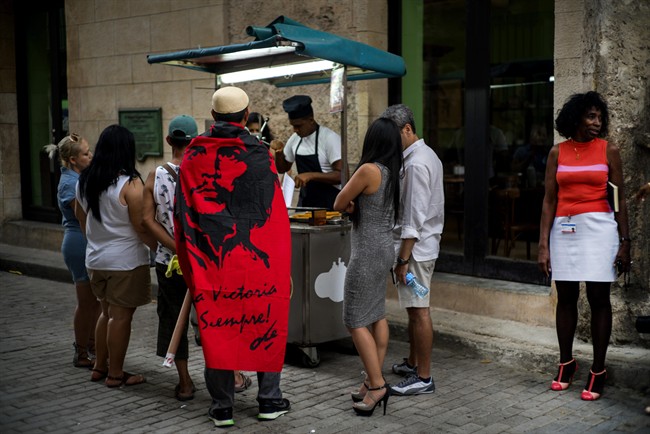HAVANA – Cuba announced Tuesday that it will legalize small- and medium-sized private businesses in a move that could significantly expand private enterprise in one of the world’s last communist countries.

READ MORE: 1st U.S. cruise ship in nearly 40 years docks in Cuba
Cuban business owners and economic experts said they were hopeful the reform would allow private firms to import wholesale supplies and export products to other countries for the first time, removing a major obstacle to private business growth.
“This is a tremendously important step,” said Alfonso Valentin Larrea Barroso, director-general of Scenius, a co-operatively run economic consulting firm in Havana.
“They’re creating, legally speaking, the non-state sector of the economy. They’re making that sector official.”
While the government offered no immediate further details, the new business categories appear to be the next stage in reforms initiated by President Raul Castro after he took over from his brother Fidel Castro in 2008. While those reforms have allowed about half a million Cubans to start work in the private sector, the process has been slow and marked by periodic reversals.

The government has regularly cracked down on private businesses that flourish and compete with Cuba’s chronically inefficient state monopolies. The latest backlash came after President Barack Obama met private business owners during his March 20-22 visit to Cuba, prompting hard-line communists to warn that the U.S. wants to turn entrepreneurs into a tool to overturn the island’s socialist revolution.
The Communist Party documents, published in a special tabloid sold at state newsstands Tuesday, said a category of small, mid-sized and “micro” private business was being added to a master plan for social and economic development approved by last month’s Cuban Communist Party Congress. The twice-a-decade meeting sets the direction for the single-party state for the coming five years.
READ MORE: Fidel Castro gives rare speech saying he will die soon, but his ideas will outlive him
The 32-page party document published Tuesday is the first comprehensive accounting of the decisions taken by the party congress, which was closed to the public and international press. State media reported few details of the debate or decisions taken at the meeting but featured harsh rhetoric from leading officials about the continuing threat from U.S. imperialism and the dangers of international capitalism.
That tough talk, it now appears, was accompanied by what could be a major step in Cuba’s ongoing reform of its centrally planned economy.
“Private property in certain means of production contributes to employment, economic efficiency and well-being, in a context in which socialist property relationships predominate,” reads one section of the “Conceptualization of the Cuban Economic and Social Model of Socialist Development.”
Vanessa Arocha, a 56-year-old architect who makes hand-made purses and bags at home under a self-employed worker’s license, said she dreamed of forming a legally recognized small business that could import supplies and machinery and hire neighbours looking for extra income.
“I could import fittings, zippers, vinyl,” she said. “Being a small business would be a new experience, one we know little about, but something very positive.”
The government currently allows private enterprise by self-employed workers in several hundred job categories ranging from restaurant owner to hairdresser. Many of those workers have become de-facto small business owners employing other Cubans in enterprises providing vital stimulus to Cuba’s stagnant centrally planned economy.
READ MORE: Cubans eager for change after Obama visit
The Cuban government blames the half-century-old U.S. trade embargo on Cuba for strangling the island’s economy. Cuba’s new class of entrepreneurs say the embargo is a major obstacle but also lodges frequent, bitter complaints about the difficulties of running a business in a system that does not officially recognize them.
Low-level officials often engage in crackdowns on successful businesses for supposed violations of the arcane rules on self-employment. And the government maintains a monopoly on imports and export that funnels badly needed products exclusively to state-run enterprises.
Due to its dilapidated state-run economy, Cuba imports most of what it consumes, from rice to air conditioners. Most private businesses are forced to buy scarce supplies from state retail stores or on the black market, increasing the scarcity of basic goods and driving up prices for ordinary Cubans. Many entrepreneurs pay networks of “mules” to import goods in checked airline baggage, adding huge costs and delays.
The latest change will almost certainly take months to become law. Such reforms typically require formal approval by Cuba’s National Assembly, which meets only twice a year.
Correspondent Andrea Rodriguez contributed to this report.



Comments